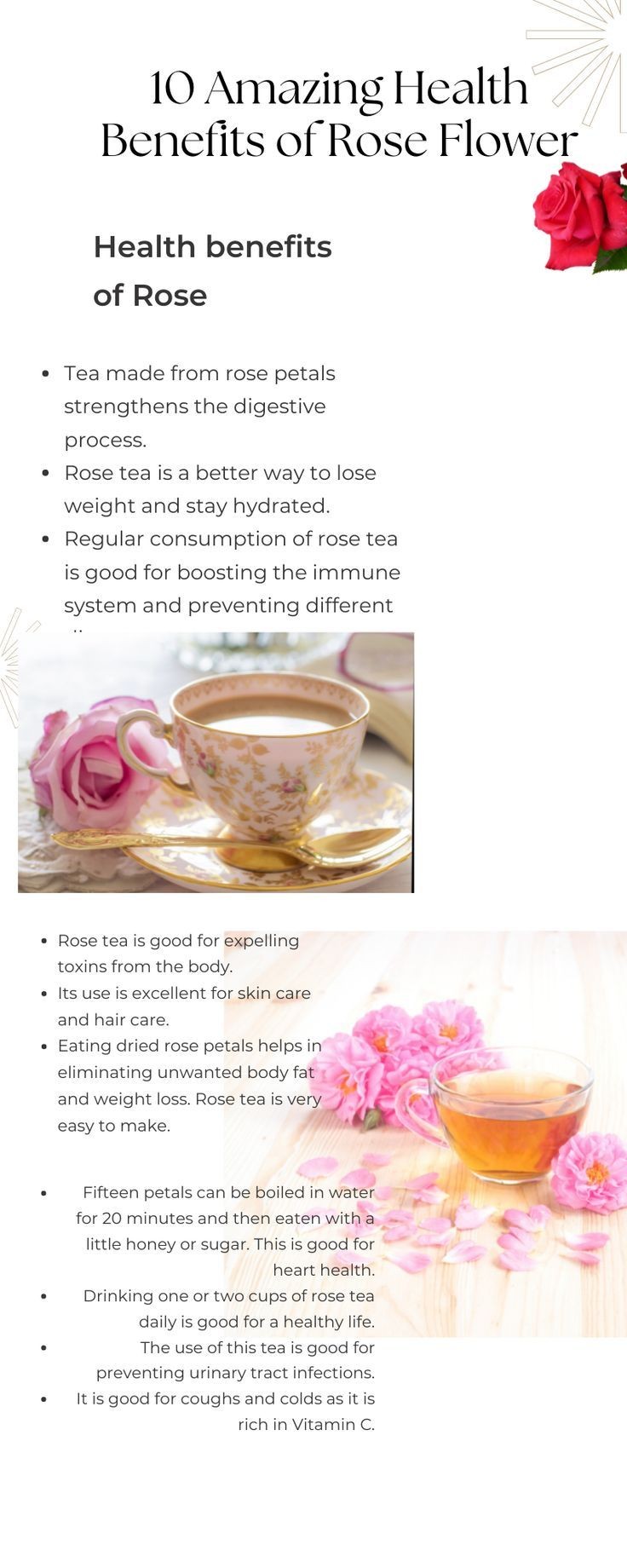
Contents
Health Benefits and Daily Consumption of Rose Tea
Rose tea, made from fresh or dried petals and buds of the rose flower, offers numerous health benefits. It is rich in antioxidants, relieves pain, may aid in cancer prevention, and more.
You may be familiar with the pleasant aroma of fresh red roses or the use of rosewater and rose oil in skincare. However, have you ever considered drinking rose tea?
While roses are known for their beauty, fragrance, and skincare benefits, they are also edible and drinkable. Let’s explore why rose tea deserves recognition in the world of flowers.
Rose tea is made from fresh or dried rose petals and buds.
The rose, one of the oldest cultivated flowers, dates back approximately 5,000 years and likely originated in Asia. Despite being widely associated with beauty, rose petals and buds have culinary uses as well.
Making rose tea is a simple process. Boil water and add clean rose petals (fresh or dried) to the water. A good ratio is about 2 tablespoons of rose per 2 cups of water, but feel free to adjust according to your taste. Simmer the mixture for at least 5 minutes, strain out the petals, and serve.
In addition to petals and buds, the U.S. Food and Drug Administration confirms the edibility of rose leaves, rose oils, rosehips, and rosewater.
The quality of rose tea can be affected by how the petals are dried. Currently, most manufacturers dry them manually with solar energy. However, a 2019 study suggests that using a freeze dryer preserves the petal’s original properties better, including color, taste, fragrance, and nutritional value.
Now that you know what rose tea is and its preparation, you may wonder about its health benefits.
Benefits of Rose Tea
Roses have been used for their healing properties for centuries.
Similar to green and black tea, rose tea is rich in antioxidants that protect the body from the harmful effects of oxygen. It contains high levels of vitamin E, vitamin C, and polyphenols.
While some benefits are supported by anecdotal evidence and require further research, rose tea has potential in the following areas:
- Pain relief: The polyphenols in rose tea can reduce inflammation-related pain. Vitamin C has been used to alleviate postsurgical pain and enhance the effectiveness of chest pain medication. Rose tea is also effective in relieving menstrual cramps.
- Cancer prevention: Rose tea’s vitamin E content can help prevent certain cancers, such as breast, oral, and pancreatic cancer. Studies have found that rose petal extract inhibits lung cancer cells.
- Blood pressure regulation: Regular consumption of rose tea can help prevent high blood pressure, a condition that can lead to organ damage, strokes, and heart attacks if left untreated.
- Improved skin and hair health: The vitamin C and vitamin E in rose tea contribute to healthier skin and hair. These nutrients can reduce the appearance of wrinkles, treat sunburn, and potentially prevent hair loss.
- Boosted immune system: Antioxidants in rose tea support a stronger immune system, helping to ward off common illnesses and serious viruses.
- Heart health: An antioxidant-rich diet, including rose tea, can reduce the risk of heart attacks. Antioxidants are also known to lower the risk of cancer.
- Enhanced brain function: Polyphenols in rose tea contribute to improved brain structure, slowed brain aging, and reduced memory loss.
- Improved digestion: Rose tea aids the proper functioning of the digestive system and can serve as a gentle natural laxative.
- Weight management: Rose tea, being a healthy beverage primarily composed of water with fat cell-inhibiting polyphenols, can assist in weight management and contribute to overall health.
- Enhanced mood: Antioxidants have mood-enhancing effects. Vitamin C, when combined with antidepressants, can increase their efficacy. Many people find that rose tea has a calming effect and helps them relax during stressful times.
Taste of Rose Tea
The taste of rose tea varies depending on the rose variety used, ranging from bitter to sweet. A study revealed that tea made from the R. damascena rose was notably sweeter than other varieties.
Generally, rose tea has a light, subtly fruity flavor that many find pleasant and refreshing.
If you prefer, you can add honey, spices like cinnamon, or a bit of milk to customize the taste of your rose tea.
Side Effects of Rose Tea
For most people, drinking rose tea is unlikely to cause any adverse effects.
The main potential side effect is an allergic reaction, although roses produce relatively little pollen. Some individuals with rose allergies may experience symptoms such as itchiness, sneezing, wheezing, and congestion.
Consuming excessive amounts of vitamin C can lead to discomfort such as nausea, stomach cramps, vomiting, and headaches. However, it is unlikely that the dosage obtained from drinking rose tea will exceed the recommended limits, which are usually in excess of 2,000 milligrams.
Is It Safe to Drink Rose Tea Daily?
Assuming you are not allergic to roses and are drinking only one or two cups per day, there is no reason why you cannot enjoy rose tea on a daily basis. It offers a caffeine-free way to enjoy the benefits of antioxidants and is a great addition to a healthy diet.
Sources:
Healthy Focus: "10 Science Backed Benefits of Rose Tea."
IOP Conference Series: Earth and Environmental Science: "Physical quality change of rose tea during freeze drying."
Journal of Food Science: "Rose Petal Tea as an Antioxidant-rich Beverage: Cultivar Effects."
Journal of Midwifery & Women’s Health: "Rose tea for relief of primary dysmenorrhea in adolescents: a randomized controlled trial in Taiwan."
Journal of Traditional and Complementary Medicine: "Rosa damascena as holy ancient herb with novel applications."
Molecules: "Rose (Rosa gallica) Petal Extract Suppress Proliferation, Migration, and Invasion of Human Lung Adenocarcinoma A549 Cells through via the EGFR Signaling Pathway."
National Council on Aging: "Vitamin C and Older Adults: How Much Is Enough?"
St. Luke’s Health: "A quick guide to flowers in food."
The University of Alabama at Birmingham: "Love is in the air — or is it allergies?"
University of Missouri Integrated Pest Management: "The Power of Flowers," "Rose: A Brief History."


